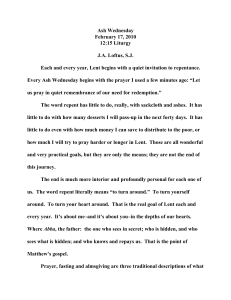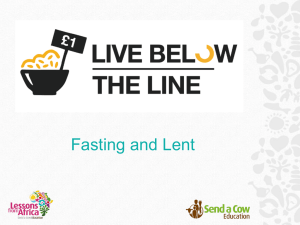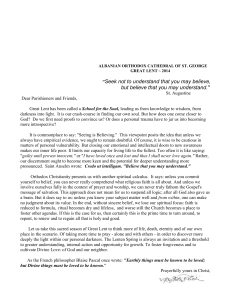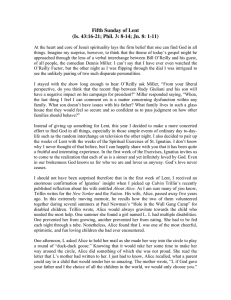1 Sunday in Lent February 26, 2012 4Pm & Noon Liturgies
advertisement
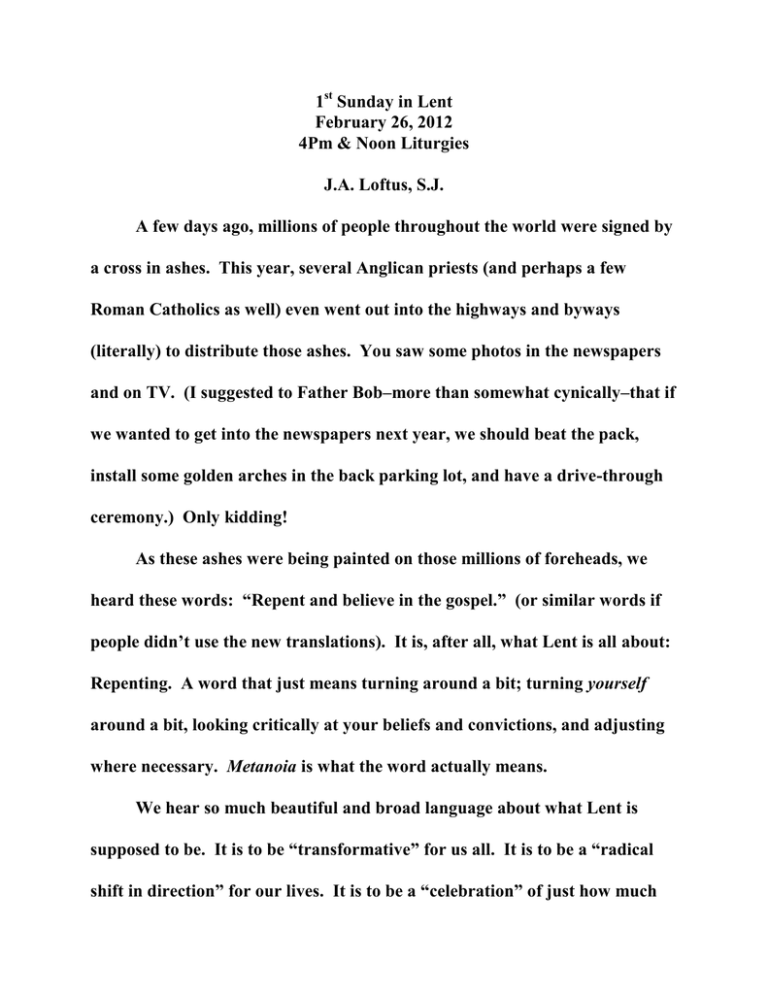
1st Sunday in Lent February 26, 2012 4Pm & Noon Liturgies J.A. Loftus, S.J. A few days ago, millions of people throughout the world were signed by a cross in ashes. This year, several Anglican priests (and perhaps a few Roman Catholics as well) even went out into the highways and byways (literally) to distribute those ashes. You saw some photos in the newspapers and on TV. (I suggested to Father Bob–more than somewhat cynically–that if we wanted to get into the newspapers next year, we should beat the pack, install some golden arches in the back parking lot, and have a drive-through ceremony.) Only kidding! As these ashes were being painted on those millions of foreheads, we heard these words: “Repent and believe in the gospel.” (or similar words if people didn’t use the new translations). It is, after all, what Lent is all about: Repenting. A word that just means turning around a bit; turning yourself around a bit, looking critically at your beliefs and convictions, and adjusting where necessary. Metanoia is what the word actually means. We hear so much beautiful and broad language about what Lent is supposed to be. It is to be “transformative” for us all. It is to be a “radical shift in direction” for our lives. It is to be a “celebration” of just how much we are all loved by God and are called to embody that love in our own earthly lives. It is radical “Good News”–supposedly. So how come so many people still think it’s really about chocolate? Or desserts in general? Or giving up my scotch for six weeks? How come Lent gets so easily domesticated? Theologian John Shea asked the same question. And he answered it by going back to a wonderful, old, article called “Following Jesus into faith” by Beatrice Bruteau (Journal of Christian Healing, Fall, 1988). She answers the question “why is it so difficult to repent and believe the gospel” with a whole other set of questions. She says it is because we harbor so many other beliefs that do not fit into this Good News. Beliefs like: “Health and beauty, money and power are necessary for happiness.” “I am identified by my body, personality, and possessions.” “My welfare is more important than yours.” “No one willingly gives up power.” The world is here for us to exploit.” (Sounds like a candidate for President this year.) “No one can really be trusted.” (Sounds like most of the other politicians these days.) “There have to be winners and losers.” “They hurt me, so I must get even.” “I can’t feel good about myself unless I’m better than somebody.” “Some people are supposed to dominate other people.” “If everyone were good, life would be boring.” These are 2 actually powerful, core beliefs that many hold. Now, of course, we are not always aware we hold some of these beliefs or other beliefs that keep us from embracing the Good News. But it might be interesting to trace our actions in everyday life back to their source. (There’s some homework for you for the first week of Lent.) Some of our real beliefs may just be mindless internalizations of certain cultural assumptions we all live with. Some others may just be generalizations from some negative personal experience we’ve had. Every first Sunday in Lent we are all led to a desert with Jesus. Mark’s version is sparse and spare. Unlike Matthew and Luke, Mark urges us to use our own imagination rather than telling us how he imagines Jesus might have been tested. Maybe Mark knows that we’re all really tested by the same things. W are all, Jesus included, tested to pretend to be more than we are or to let ourselves be less than we really are. We all sometimes think we belong on the pinnacle of some temple. We all some times want to worship different gods. We all sometimes think maybe we are a god–or at least we act that way. All our own deserts are essentially the same. But the Good News of the gospel we hear again today comes through a character named Noah. God makes a covenant, a sacred promise, not just 3 with us humans, but with all the creatures on the earth, and with the earth itself. And the sacred Promise is: I will always be with you from this day forward, and I will never again threaten you. Just embody my love in the time and space and place called earth. Why should it be so difficult to repent and believe that gospel? Why indeed? Good luck with your homework. Welcome to the real Lent! 4
